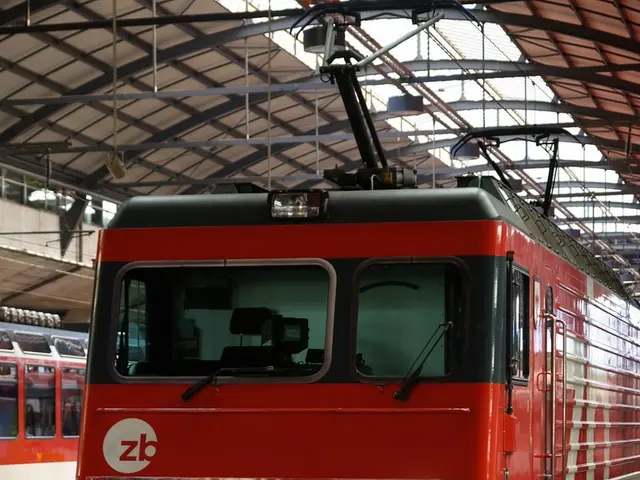Ignoring the Safety of Elderly and Emergency Cases: The Plague of Illegal Parking Blockades
- *
Obstructed Access to Walkways and Emergency Paths - Frustration from Inappropriate Vehicle Parking - Incident of Obstructed Emergency and Pedestrian Access - Challenges with Vehicle Parking
Hesitating firefighters, ambulances stalled, and lives at risk - that's the reality when it comes to illegal parking in certain German towns. In Schwalmbach, a man parks casually in front of a retirement home, blocking the fire department's access. Similar scenes unfold in Celle, Lower Saxony, where an ambulance can't reach a patient due to blocked streets.
In fabricated circumstances across North Rhine-Westphalia, numerous cars hog space, blocking the fire department's access to a burning building. In Cologne, a firetruck can't reach the disaster scene due to a vehicle parked thoughtlessly; unfortunately, a victim loses his life. This selfish and irresponsible act of parking illegally has become a dangerous, ongoing nuisance—even for municipalities in the southwest.
Let's shed some light on Heidelberg. The city is particularly concerned about cars obstructing sidewalks and emergency routes. "These violations endanger weaker road users and pose a significant safety risk," remarks a city spokesperson. To tackle this issue head-on, Heidelberg has devised a multi-phase safety concept for sidewalk parking.
Karlsruhe vehemently complains about drivers regularly blocking fire protection zones or emergency routes. Ambulances face difficulties in passing due to cars parked in such a manner that the streets narrow.
The state fire brigade association and the transport minister stress that "parked vehicles often obstruct emergency access, especially in residential areas." For large emergency vehicles in narrow and blockaded streets, valuable time for saving lives is wasted. "If there's an immediate emergency, firefighters will clear a path," guarantees a spokesperson for the association.
"Illegal parking is no trivial matter. Those who block emergency routes or put children in danger on their way to school are acting callously and recklessly," states Transport Minister Winfried Hermann (Greens). Given the ever-growing size of vehicles and the general lack of compliance with parking rules, he advocates for stricter measures against parking violations.
Swirling surges of vehicles in cities - a rising tide of automobiles in the southwest. "More and more people reside in Freiburg, and the number of cars registered in Freiburg is also increasing," explains a city representative in Freiburg. "This swell triggers an escalation in the number of parked cars." Heidelberg reports a parking space occupancy rate of 82.5%. Similarly, Tübingen reports a persistently high car presence.
The number of passenger cars in the southwest is skyrocketing, reports the transport ministry. Since 2010, it has risen by 19%, while the population has increased merely by 4% in the same period. However, fewer journeys are undertaken overall, explains Martin Kagerbauer, a transport pro at the Karlsruhe Institute of Technology (KIT). Nationwide, the percentage of miles covered by vehicles remains relatively consistent.
Parking schemes are a never-ending quest - rigorous checks are essential. Especially major cities are persistently working on streamlining the parking dilemma and pinpointing smart solutions. "The widespread notion that 'more parking spaces equals better' is misleading," cautions Kagerbauer. This mentality creates incentives for even more cars and, in turn, increase instances of so-called parking search traffic. Instead, alternative modes like efficient public transport or bike paths should be promoted.
Remarkably antisocial, yet never entirely preventable, says Kagerbauer. "Inspecting is the most effective means," he underscores, while also criticizing illegal parking reporting apps. "That's just poor neighborliness. If there's a legitimate parking strategy in place, such actions aren't necessary."
Cities are stealthily gravitating towards digital parking management - could scanning vehicles be next?
Heidelberg plans to digitalize its so-called parking space administration increasingly, such as introducing digital resident permits. In addition, the city reportedly relies on an "issue reporter" system: citizens can report parking violations online, via phone, or by email. A data platform is currently being constructed that indicates the state of parking space management in southwestern Germany.
Feed your eyes on the latest parking enforcement technology: scanning vehicles! With a legal basis formed by the new state mobility law, this innovative control method allows a person to examine up to 1,000 vehicles per hour, rather than just approximately 50 on foot. This technique leapfrogs traditional methods in effectiveness.
A cooperative effort between Freiburg, the Ministry of Transport, and the Baden-Württemberg public transport company may soon bring scanning vehicles to life in a pilot project. Heidelberg, Heilbronn, and Mannheim are also on board. Initial trials are already commencing at the University of Hohenheim, with more to follow. Will freedom from parking woes speed into nearby towns? Stay tuned!
- Illegal Parking
- Street Blockade
- Vehicle
- Car
- Heidelberg
- Celle
- Lower Saxony
- Emergency Medical Services
- Annoyance
- Karlsruhe
- Nursing Home
- Ministry of Transport
- Fire Brigade
- North Rhine-Westphalia
- Cologne
Illuminating Insights:
- Highly efficient and rapid detection of illegal parking can be attained with mobile scanning vehicles, dramatically increasing enforcement efficiency, hence reducing emergency route blockages [1][4]
- Real-time detection of parking violations, combined with administrative imposement of fines, can reduce the occurrence of illegal parking and improve traffic flow [4]
- Combining scanning vehicles with smart parking management technologies, such as RFID and real-time space monitoring, can create a comprehensive urban parking control ecosystem that alleviates parking dilemmas, including emergency route blockages [2][3][5]
- The implementation of mobile scanning vehicles in cities like Heidelberg, Freiburg, and Mannheim could help eliminate emergency route blockages caused by illegal parking, as these devices can detect up to 1,000 vehicles per hour [1][4].
- The integration of various technologies, such as RFID and real-time space monitoring, alongside scanning vehicles, can create a comprehensive urban parking control ecosystem, alleviating parking issues and reducing emergency route blockages [2][3][5].








